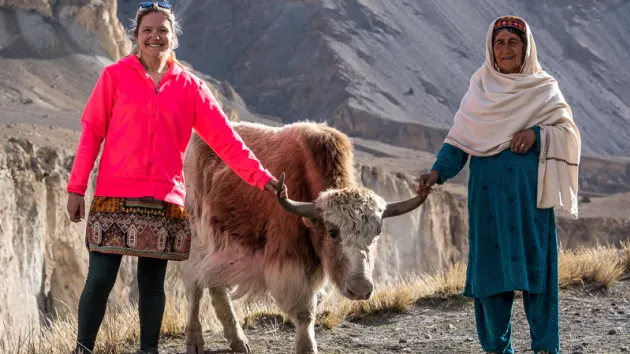
Posted on 02/17/2024 2:50:49 PM PST by Red Badger

A Wakhi woman and her yak in Avgarch Village, one of the oldest settlements of Hunza Valley that’s only accessible by foot. Photo: Samantha Shea
~~~~~~~~~~~~~~~~~~~~~~~~~~~~~~~~~~~~~~~~~~~~~~~~~~~~~~~~~~
In a little-known mountainous area called Hunza Valley, located far north of Pakistan, people seem to defy all medical odds.
It is primarily home to the Burusho and Wakhi people, who for centuries have survived and thrived in remote villages — with minimal amenities and rudimentary health facilities. Studies have found that the average life expectancy here is around 100 years.
My husband was born and raised here, and is from the Burusho indigenous community. After we got married, I left the U.S. and we settled down in the Central part of the valley.
Here are some intriguing habits that help the people of Hunza live longer:
1. They consume apricot seeds and oil
Apricot trees are one of the most important local crops in the valley. Studies have shown that apricot seeds can help fight cancer and other sources of inflammation in the body, in part due to a compound called amygdalin.
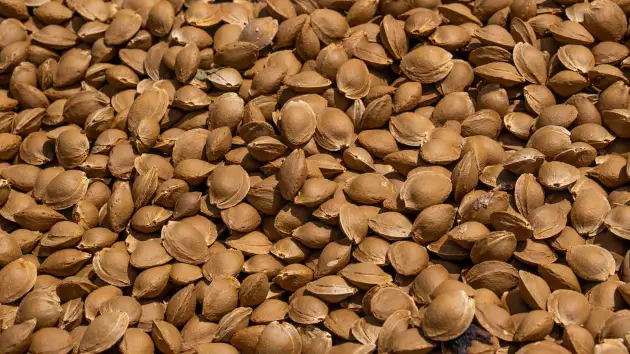
Most people in Hunza have at least one apricot tree, and the seeds are harvested from inside the apricots every summer. Photo: Samantha Shea
Nearly every traditional Hunzai dish includes apricot oil. Back in the day, it was made by hand, but now locals use machines to extract it from their harvested kernels.
My mother-in-law told me that 50 years ago, it was all anyone used to cook food with, even meat. Dried versions of the fruit also help with altitude sickness, and are boiled into a soup come winter.
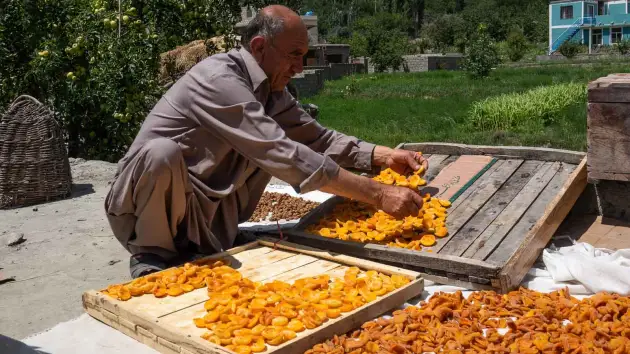
My father-in-law organizing dried apricots on his roof Photo: Samantha Shea
2. They never stop moving
People here are healthy and active throughout their lives, well into old age. It’s very common to see folks in their 80s outside, even in the winter. Elderly family members still graze their cows and sheep, collect wood, and do other household tasks.
They also participate in community activities like “rajaki,” which involves cleaning out the elevated water canals when spring arrives.
Locals of all ages cycle, skate, and play sports like soccer and cricket every day.
3. They drink glacier water
Hunza is filled with dozens of glaciers, all of which melt throughout the summer.
A shiny, dark-grey liquid, “Hunza water” has long held the interest of scientists. Unlike other water sources, this glacial water is naturally filtered by layers of ice and rock and contains precious minerals.
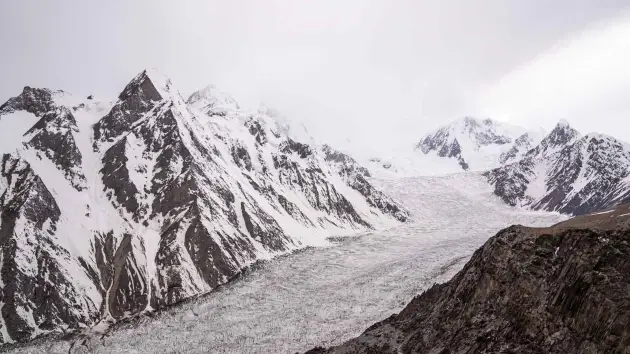
A view of the Passu Glacier from Patundas, a meadow in Upper Hunza where locals bring their livestock to every summer. Photo: Samantha Shea
Some argue that the water contains quartz (sillica) minerals in colloid form, which are considered to be powerful antioxidants.
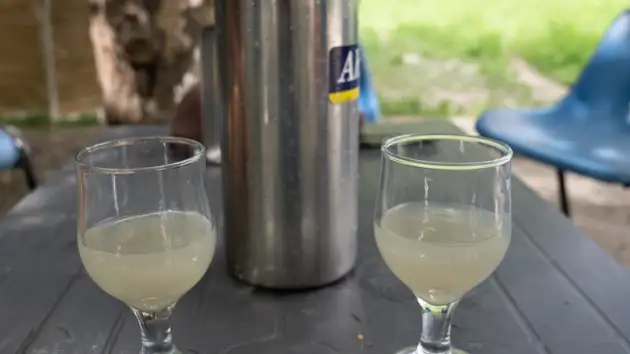
What Hunza glacier water looks like straight from the source. Photo: Samantha Shea
The runoff generally lasts from May to October each year, which is when you’ll find it served at restaurants and in homes. Locals swear by it, and prefer it to filtered water.
4. They rarely eat processed foods Almost every piece of meat eaten in Hunza comes from a locally sourced animal that’s been recently killed.
People rarely eat processed foods, and you certainly won’t find any fast food spots here. Meals are typically prepared fresh in the home daily, and almost every household grows some kind of vegetable.
Spinach is especially popular, and other favorites like tomatoes and potatoes are grown locally and organically.
5. They have strong community values
Neighborhoods and villages are tight-knit, and the people of Hunza take care of each other, especially the older members of the community.
Retirement homes don’t exist here. Elders are highly respected and attended to by their families.
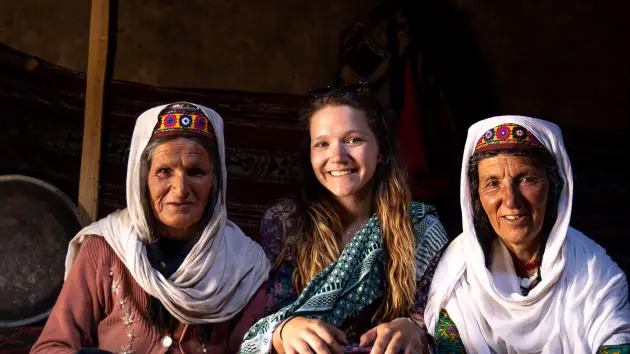
Myself and two strong older women from Chapursan Valley, which is one of the most remote parts of Hunza situated alongside the Wakhan Corridor. Photo: Samantha Shea
With essentially zero crime, it’s safe enough for kids to wander about on their own, even at young ages. It’s likely one of the last places where you’ll see more outdoor play than iPad play.
Having lived here for for the past two years, I can happily say that I’ve never had the privilege of experiencing a society as collective as this one.
~~~~~~~~~~~~~~~~~~~~~~~~~~~~~~~~~~~~~~~~~~~~~~~~~~~~~~~~~~~~
Samantha Shea is a Polish-American travel writer from Connecticut. She lives and works remotely in Hunza Valley, Pakistan, and runs women’s tours to the region. Follow her on Instagram and YouTube.
That’s because KARENS are as*h***s.
She sounded cool.
Lol.
Notice the ‘glacial’ water is sitting in a wine glass. Guess that means we’re missing something.
Living to 100 is great if they are active but for someone who is bedridden for the last 5-10 years, not so great.
People who live, grow up, and work their farms all their life stay active as well. Some may even play sports or go to the gym. I personally just ride a bicycle and walk my dogs to try and “not let the old man in”.
The people who work in offices and sit most the day are at the most risk of a shortened lifespan. It’s an easy rut to fall into.
Interesting article.
I do like apricots, always have on hand. :-) And I never eat pre-prepared aka as “fake” food. Not in decades. But my health is not like these people! Lack of stress must also play a factor, as well as the clean air/water/food. And friendliness towards each other, and no anti-social/chaos insanity. I hope their way of life does not get invaded by rot.
Getting sauced, in moderation, is fine.(for some)
The “secret” seems to be move, live low stress, eat plants and animals, have family and friends nearby, and I would add sleep enough.
Here is one of the lakes at Joffre Lakes Park in British Columbia (a fantastic hike!)
And neither does colloid silver. I’ve used colloid silver for years and I’m still as white as the day I was born.
Just saw a picture of Jimmy Carter at age 99.
I do no want to live to be in that condition.
all these articles on small populations that live a long life have one thing in common: They ignore that a lot of children die of malnutrition/infectious disease/Tuberculosis... not to mention deaths from childbirth, war, and accidents.
The low protein, low fat diet leads to a long life, but only if you survive these other threats to life.
A higher altitude seems to be a factor.
The Blue Zones are an amazing study, peoples that live to 100s regularly. Healthy diet, keep moving (mostly up and down hills and always walking) and community support are main factors.
I bet the elevation and lower oxygen levels have something to do with it as well..........................
All the Blue Zones are tight knit communities and keep their family members at home as they age. But most of us don’t live in tight knit communities and family doesn’t live nearby. It’s overwhelming to care for parents with chronic health problems. It often falls to one child, and it’s impossible for one person to handle nurse, med tech, food, laundry, home maintenance, transportation, medical appointments, medicine, and financial duties without completely giving up their own life. My dad has dementia and my mom can no longer handle taking care of him. She also has physical and congnitive decline, so all of the above fall on me for both of them. Sometimes there is no choice but assisted living whether they want to move or not.
My mom who lived to 102 — died only after breaking her hip — was very much like that and your description could have been about her just as well.
Getting old sucks. Read it here. All you need to know.
https://www.psychologytoday.com/us/blog/the-power-prime/201312/getting-old-sucks
Good for her! Sounds like a sweet but also strong lady.
Disclaimer: Opinions posted on Free Republic are those of the individual posters and do not necessarily represent the opinion of Free Republic or its management. All materials posted herein are protected by copyright law and the exemption for fair use of copyrighted works.